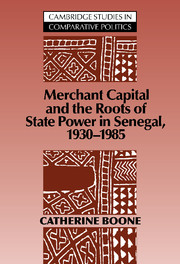Book contents
- Frontmatter
- Contents
- List of tables and figure
- Preface and acknowledgments
- Introduction
- 1 Capital and contingencies of postcolonial politics
- 2 The colonial market
- 3 Consolidation of a regime: Neocolonialism in the 1960s
- 4 Growth of Senegal's textile industry, 1960–1975
- 5 Reappropriation of the state: The 1970s
- 6 Demise of the Dakar textile industry
- Conclusion: States, capital, and capitalist states
- Appendix: Exchange rates
- References
- Index
Conclusion: States, capital, and capitalist states
Published online by Cambridge University Press: 13 October 2009
- Frontmatter
- Contents
- List of tables and figure
- Preface and acknowledgments
- Introduction
- 1 Capital and contingencies of postcolonial politics
- 2 The colonial market
- 3 Consolidation of a regime: Neocolonialism in the 1960s
- 4 Growth of Senegal's textile industry, 1960–1975
- 5 Reappropriation of the state: The 1970s
- 6 Demise of the Dakar textile industry
- Conclusion: States, capital, and capitalist states
- Appendix: Exchange rates
- References
- Index
Summary
It would be incorrect to see in the replacement of the colonial state by the postcolonial state merely a distinction without a difference. The colonial state provided imperialism with a quite direct and unmediated instrument for control in the interests of [capital] within the colonial social formation. The postcolonial state … is something more of an unpredictable quantity in this regard. … Under African conditions, [there has sometimes been an] ironic kind of ‘threat’ to imperial interests: the crystallization in many African settings of a state too weak and too internally compromised … to effectively guarantee the ongoing generation of surplus and accumulation of capital.
John Saul 1979:350–1Where … is the social agent to champion capitalist transformation?
Richard Sandbrook 1985:39Analysts of comparative politics have turned their attention to explaining differences in state capacities and in degrees of state autonomy that are observed across contexts. These differences are registered in the relative success (or failure) of states in promoting social transformation or, in more precise formulations, capitalist development. State ideologies and the development of coherent state institutions that can overpower societally based opposition to state goals are often put forward as “independent” or causal variables to account for the successes of some states in promoting capitalist development.
- Type
- Chapter
- Information
- Merchant Capital and the Roots of State Power in Senegal1930–1985, pp. 252 - 272Publisher: Cambridge University PressPrint publication year: 1992



